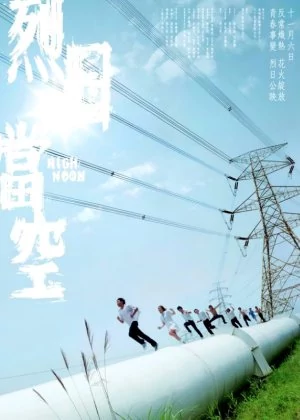High Noon

Hong Kong films are usually littered with martial arts hero's, gunslinger legends and sex-crazed boys. Not often do you get the chance to catch a glimpse of a more realistic Hong Kong, let alone see something about their rising generation. If only because High Noon shows you just that, it's a film worth mentioning here.

While the Asian market is not actually shy of good films, not all Asian industries have a varied catalogue on display. Even large ones like the Hong Kong market have gained success on a very limited base of genres. There are of course exceptions to the rule, but they remain scarce and are often hard to track down. And so it's cool to see that some of the big names in Hong Kong are redirecting some money to young and talented directors who set out to enrich the face of their film industry. Winds of September is a project produced by Eric Tsang and sports three films. All of these films are based on the same script (written by Tom Lin), but are set in a different country and feature young local talent both in front and behind the camera. Some time ago I already reviewed the Taiwanese Winds of September, High Noon is the Hong Kong entry (and completing the series will be a Chinese entry).
High Noon is the story about a tight group of seven boys, more concerned about hanging out than getting a good education. They regularly skip classes, date girls and get into trouble. The film is not so much concerned by telling a straight and coherent story, but puts more focus on the chemistry within the group. All boys have their input and troubles, affecting the flow of their little ensemble, but ultimately tearing it apart. As with many relationship, they are formed within a certain context, and when that context starts to fade (graduation from school for example) there is often little left to keep the relationship going.

The film is obviously the effort of a first-time director still in touch with the themes of his work. Visually Mak was able to give the film a rather youthful facade, applying different styles and effects to portray the life of the seven boys. Sometimes using a handycam look to get in close with the group, sometimes opting for static wide shots, at one time even playing with on-screen text, avatars and a group of rotating boys. Not everything is perfectly executed, but High Noon remains visually eventful and bursts with youthful enthusiasm, which adds a lot to the feel of the film. Some scenes feel a little "too real" where the film is still aiming for a stylized look, but overall it is very pleasant to behold.
The score is pretty nice too, but not as bold as the images. Mak takes a safer route by applying soft background music that peaks in only a handful of scenes. It is probably better than selecting a series of pop songs (which is usually the case with films like these) but it would've been nice to see this handled in a more adventurous way. Adding some extra spunk to the film are the actors who all fill their roles with welcome vigor. Even though they all represent some kind of cliché, they give life to their characters and help to create an interesting group dynamic. Didn't spot too many familiar faces (unless you count Eric Tsang's mini-cameo) but I didn't miss them at all.

While watching the film I had a hard time deciding whether I really liked the film or just felt glad with the fresh approach Mak was taking. While I was taken with his enthusiastic approach it doesn't always work and it does give the film a rather flimsy edge in some scenes. When the more dramatic side is introduced in the second half of the film it takes away some of the energy and adds a more subdued feel to High Noon. It is maybe a little ironic that straying away from what makes this film so interesting kind of saved the ending for me, on the other hand it wouldn't have worked without the first half of the film.
High Noon is an interesting watch, working well as a playful drama grounded in HK youth culture. There aren't too many Hong Kong films it can be compared to, though while watching I was reminded of Royston Tan's 15: The Movie several times. If you're interested to see a different side from Hong Kong cinema and if you can appreciate the adolescent styling of the film, be sure to check this one out. It's nice that people like Tsang are willing to invest money in films like this, but it won't really help the industry if nobody's watching them.